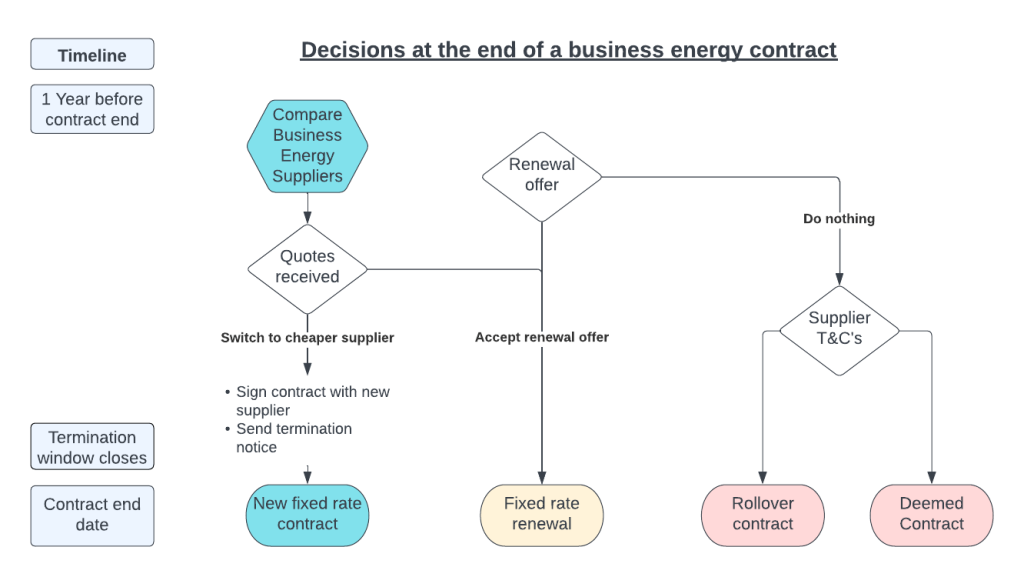A complete guide to business energy contracts
Business energy contracts are legally binding agreements between a company and a licensed supplier for the supply of gas or electricity to commercial premises.
This guide answers the key questions about how business energy contracts work.
Here’s what we cover:
- Types of business energy contracts
- Understanding key business energy contract terms
- Business energy contract timeline
- What happens when your business energy contract ends?
- Business energy contract formats
Types of business energy contracts
Below are the most common types of business energy contracts used by SMEs when purchasing electricity and gas supplies.
Large organisations use more complex procurement strategies; for more information on these, visit our large business energy page.
Fixed-rate business energy contract
A fixed-rate tariff is the most popular option for small business energy customers. You pay a fixed unit cost plus a daily business energy standing charge throughout the agreed term of the contract.
Monthly bills vary over the year depending on your energy usage, but the unit rate per kWh of energy consumed remains fixed. This allows businesses to forecast their energy costs more accurately.
Cancelling or switching before the contract end date typically requires payment of an early termination fee. Find out more in our guide on how to cancel a business energy contract.
Variable-rate business energy contract
A variable-rate business energy tariff is often described as a “freedom” or “flexible” tariff. There is no fixed contract period, and customers can switch to another tariff or supplier at any time.
In a variable-rate tariff, the amount you pay per kWh can change with one month’s notice to reflect current wholesale market conditions.
Commercial electricity and business gas suppliers often use the variable-rate tariff as their default contract when a fixed tariff ends.
Rollover business energy contract
A rollover business energy contract is an automatic agreement between you and your current business energy supplier, which can apply when you reach the end of your fixed tariff but haven’t made any arrangements to renew or switch business energy suppliers.
If an automatic rollover applies to your fixed contract, then:
- Your current energy tariff will extend for a new fixed period (typically one year).
- You’ll pay a new fixed unit rate and daily standing charge during the new fixed period, as defined by your supplier.
Rollover business energy contracts are legally binding and cannot be terminated early, except in the case of a change in tenancy.
Multi-rate business energy contract
Multi-rate business energy contracts are a type of electricity tariff where the unit rate depends on the time of day when the electricity is consumed.
In a multi-rate business energy contract, businesses benefit from lower business energy rates during the night, when there is less demand for energy.
To take advantage of a multi-rate tariff, it is necessary to have one of the following meter types:
- Economy 7/10 meter
- Smart business energy meter
- Half-hourly electricity meter
Green business energy contract
A green business energy contract is a type of tariff where your supplier reduces the environmental impact of your electricity and gas by doing one of the following:
- Purchasing Renewable Energy Guarantees of Origin to certify that the electricity supplied is from renewable sources.
- Purchasing green biogas as an alternative to natural gas.
- Purchasing carbon credits to offset the carbon impact of the electricity or gas supplied.
Green business energy contracts can be fixed, variable, or multi-rate. For more information, visit our complete guide to renewable energy for businesses.
Understanding key business energy contract terms
When agreeing a new business energy contract, it’s crucial to check that the following details about your business are correct to avoid complications and delays to the switching process:
- Registered business name and registration number – The business responsible for paying business energy bills for the supplied property.
- Supplied address – The address of the commercial property receiving the electricity or gas supplies.
- Supply point IDs – The unique identifiers MPAN (for electricity) and MPRN (for gas) associated with your commercial property.
Aside from these business details, here are the three most important elements to understand when agreeing a new business energy contract:
Estimated annual cost
Business energy quotes and contracts typically state an estimated annual cost for your contract, which incorporates:
- Agreed business electricity prices/commercial gas rates per kWh
- Agreed daily standing charges
- The estimated annual business energy consumption of your property
The estimated annual cost of a business energy contract allows you to easily compare business electricity quotes by incorporating all cost elements within your contract.
To rely on the estimated annual cost in your contract, it’s important to provide a realistic estimate of your annual electricity or gas consumption.
The bills you pay during the contract will depend on your actual consumption, as measured by your business energy meter.
Broker or TPI commission
If you’ve used a business energy broker to arrange your energy contract, then the unit rates you pay will typically include a commission that the supplier pays to your broker over the duration of the contract.
Broker or TPI commission is usually structured as a mark-up on your unit rates, so it’s important to review this to understand how much you are paying for your broker’s services.
Contract length and early termination fees
Typically, the cheapest way for businesses to pay for their electricity and gas is by regularly comparing business energy prices and entering into fixed-rate contracts with the most competitive suppliers.
These fixed contracts offer the best rates but lock your business in with your supplier for the contract term by defining:
- Contract length – The time between the commencement date and end date, typically between 12 and 36 months.
- Contract end date – The date on which the contract will cease to supply.
If you choose to terminate your contract before the contract end date, your business will likely need to pay a substantial termination fee.
It’s crucial to understand the contract length your business is agreeing to before signing a fixed energy contract.
The exception to this is when your business moves out of the supplied property, in which case you can terminate the contract immediately without fees under Ofgem’s change in tenancy rules.
Business energy contract timeline
In the final year of a business energy contract, several key dates should be considered when deciding what to do after the contract ends.
Here’s a diagram of the basic timeline outlining the key dates at the end of a business energy contract:
We recommend adding the following important dates to your calendar:
One year before the contract end date
Twelve months before the end of a business energy contract, you’ll be able to obtain quotes from alternative suppliers and arrange a new contract, either with your current supplier or a different business energy supplier.
Termination window close date
If you want to switch business energy suppliers, you must give a certain amount of notice before the end of the contract. The notice period required depends on your specific contract, but is typically between 30 and 120 days.
This date is the deadline for avoiding an unfavourable rollover or variable contract rates.
Contract end date
All fixed business energy contracts include an end date, after which your business gas or electricity supplier ceases to provide energy at the agreed-upon per kWh unit rate and daily standing charge.
If you don’t know your contract end date or the termination notice deadline, we recommend contacting your supplier’s customer services department.
What happens when your business energy contract ends?
This section outlines the process that typically takes place at the end of a fixed-rate business energy contract.
Renewal offer from current supplier
In the final year of your fixed contract, before the termination window closes, your current supplier will issue a formal renewal offer.
A renewal offer will provide a quote for a new fixed-rate contract that begins at your current contract end date. It will include:
- A confirmation of your current contract end date
- Unit rates, standing charges, and the expected annual cost of the renewal contract
- A deadline for accepting the renewal terms
If you don’t accept the renewal offer or arrange a switch to another supplier, then automatic rollover or variable contract terms will apply from the contract end date.
Automatic rollover or variable terms
Fixed business energy contracts always include a clause explaining under what terms your current supplier will continue to provide your business with electricity and gas after your contract ends, if no other arrangements are made.
The automatic tariff that applies from the end of a business energy contract is typically either:
- A Rollover contract – You’ll automatically be contracted for a further fixed term, at a standing charge and rate per kWh determined by your current business energy supplier. You won’t be able to switch to a more favourable agreement until the end date of the rollover business energy contract.
- A Standard variable contract – You’ll pay for electricity and gas at a variable rate defined by your supplier. You can switch to another supplier or tariff at any time during a standard variable contract.
Business energy contract formats
Businesses can enter into a business energy contract verbally, through a digital signature, or via a wet signature.
We explain the three formats of legally binding business energy contracts below.
Since there is no cooling-off period for business energy contracts, it is crucial to understand the terms you are agreeing to, regardless of the format.
Paper contract
A paper contract is an agreement provided by your energy broker (a third-party intermediary) or directly by your business energy supplier as a hard copy.
This contract will include all the terms and conditions you have agreed with the energy supplier.
Once you have hand-signed the document, we recommend retaining a copy for your records and returning it to your broker or supplier as promptly as possible to ensure the contract remains valid.
Energy prices fluctuate constantly, and the contract may become invalid if there is a significant market movement.
Digital contract
A digital contract is a soft copy of the agreement provided by your broker or business energy supplier via a digital platform, such as DocuSign, that is emailed to you.
The platform will trace your IP address and allow you to sign the document digitally. Once signed, it will automatically be returned to your broker or business energy supplier, who will be notified by the platform that you have completed the process.
After signing, you will receive a copy of the signed contract. Please keep this for your records in case you have any queries or complaints.
Verbal contract
Many brokers and business energy suppliers prefer to establish verbal contracts while you are on the phone. These contracts are legally binding, even if you do not receive a written copy or a recording of the conversation.
Verbal contracts can take around 20 minutes to complete, and it is easy to miss certain details during the call. Therefore, it is essential to listen carefully to everything being said before confirming your agreement.
The caller will read from a script, and they must recite the contract verbatim. This script includes all the information you would typically receive in a soft or hard copy of the contract.
We recommend requesting an email containing a copy of your verbal agreement. This ensures you have a record of the contract and the agreed terms.
Brokers and business energy suppliers are only required to retain a copy of the agreement for one year, so having your own copy is essential in case you need to dispute the contract.

